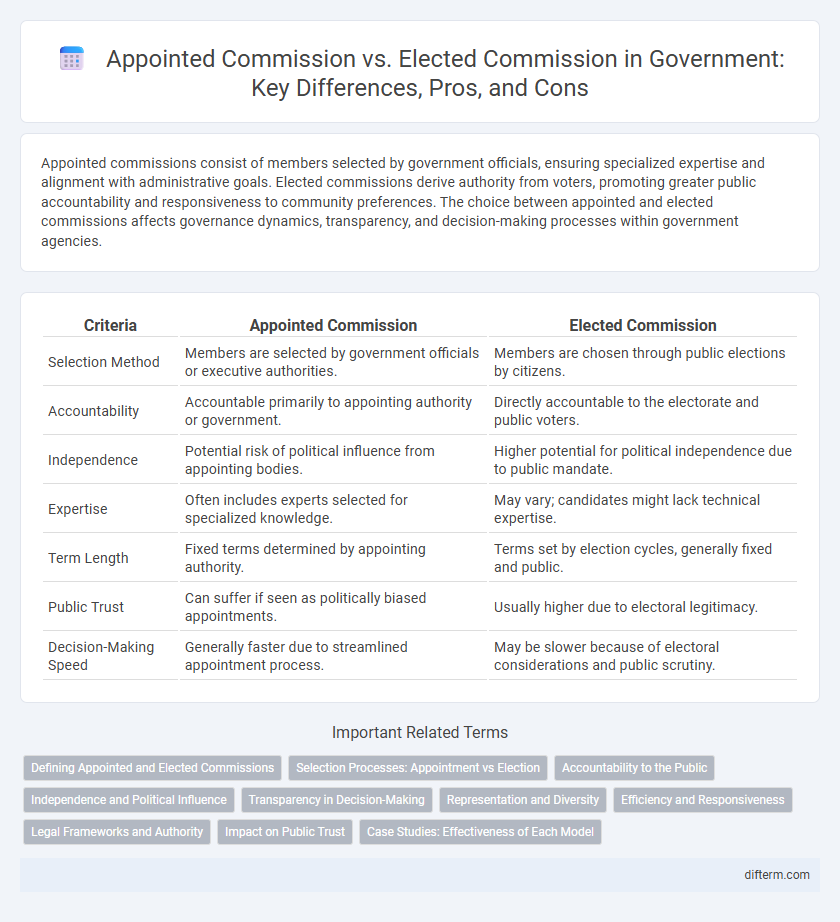Appointed commissions consist of members selected by government officials, ensuring specialized expertise and alignment with administrative goals. Elected commissions derive authority from voters, promoting greater public accountability and responsiveness to community preferences. The choice between appointed and elected commissions affects governance dynamics, transparency, and decision-making processes within government agencies.
Table of Comparison
| Criteria | Appointed Commission | Elected Commission |
|---|---|---|
| Selection Method | Members are selected by government officials or executive authorities. | Members are chosen through public elections by citizens. |
| Accountability | Accountable primarily to appointing authority or government. | Directly accountable to the electorate and public voters. |
| Independence | Potential risk of political influence from appointing bodies. | Higher potential for political independence due to public mandate. |
| Expertise | Often includes experts selected for specialized knowledge. | May vary; candidates might lack technical expertise. |
| Term Length | Fixed terms determined by appointing authority. | Terms set by election cycles, generally fixed and public. |
| Public Trust | Can suffer if seen as politically biased appointments. | Usually higher due to electoral legitimacy. |
| Decision-Making Speed | Generally faster due to streamlined appointment process. | May be slower because of electoral considerations and public scrutiny. |
Defining Appointed and Elected Commissions
Appointed commissions consist of members selected by government officials, such as the executive branch, typically based on expertise or political alignment, ensuring specialized oversight and focused governance. Elected commissions are composed of members chosen directly by voters through elections, promoting accountability and direct representation of the public's interests in decision-making processes. Both structures influence governance dynamics, with appointed commissions often emphasizing efficiency and expertise, while elected commissions prioritize democratic legitimacy and responsiveness.
Selection Processes: Appointment vs Election
Appointed commissions are formed through a selection process involving government officials or executives who choose members based on expertise, qualifications, or political alignment, ensuring specialized or strategic representation. Elected commissions rely on popular vote, allowing citizens to directly influence commission membership, which enhances democratic legitimacy and accountability. The appointment process often emphasizes professional competence, while elections prioritize public approval and responsiveness to constituent needs.
Accountability to the Public
Appointed commissions often face scrutiny due to limited direct accountability to the public, as members are selected by government officials rather than voters. Elected commissions derive legitimacy from public elections, enabling constituents to hold members accountable through voting and recall processes. The level of transparency and responsiveness to community needs frequently hinges on whether commissioners are directly elected or appointed.
Independence and Political Influence
Appointed commissions often exhibit greater independence due to selection by neutral parties or experts, minimizing direct political influence and enabling more objective decision-making. Elected commissions are susceptible to political pressures and electoral considerations, as commissioners may prioritize constituent preferences or party agendas to secure re-election. Institutional frameworks and transparency mechanisms critically shape the balance between independence and political influence in both appointment methods.
Transparency in Decision-Making
Appointed commissions often face scrutiny over transparency, as their members are selected by government officials rather than directly by the public, potentially limiting accountability in decision-making processes. Elected commissions enhance transparency by providing citizens with direct influence over the selection of decision-makers, fostering greater public trust and responsiveness. Transparency in decision-making is further bolstered in elected commissions through mandatory public meetings and accessible voting records, ensuring clearer insights into policy development.
Representation and Diversity
Appointed commissions often face criticism for limited representation and diversity due to selections influenced by political or executive preferences, potentially marginalizing minority voices. Elected commissions tend to better reflect community demographics and viewpoints, as members are directly chosen by voters, promoting inclusivity and accountability. Emphasizing diverse representation in commissions enhances policy relevance and responsiveness to the broader population's needs.
Efficiency and Responsiveness
Appointed commissions often achieve higher efficiency by selecting experts with specialized knowledge, reducing political influence and streamlining decision-making processes. Elected commissions improve responsiveness by directly reflecting voter preferences and community needs, fostering greater accountability. Balancing expertise and public representation is essential to optimize governance outcomes.
Legal Frameworks and Authority
Appointed commissions derive their authority primarily from statutory mandates or executive orders, granting them specific legal powers defined by law and often subject to oversight by the appointing body. Elected commissions, however, obtain legitimacy and authority directly from the electorate, with their legal framework typically embedded in constitutional or statutory provisions that outline their roles, responsibilities, and limits of power. The distinction in legal frameworks impacts accountability mechanisms, decision-making processes, and the scope of regulatory or administrative powers each commission holds within government operations.
Impact on Public Trust
Appointed commissions often face skepticism due to perceived lack of direct accountability, which can diminish public trust in government decisions. Elected commissions typically enjoy higher legitimacy as their members are directly chosen by voters, fostering greater confidence in their actions. Studies show that transparent appointment processes and active community engagement can mitigate trust gaps between appointed and elected bodies.
Case Studies: Effectiveness of Each Model
Appointed commissions often demonstrate higher technical expertise and consistent policy implementation, as evidenced by case studies like the Federal Reserve in the United States, where members are selected for specialized knowledge. Elected commissions, such as certain state public utility commissions, provide greater accountability and responsiveness to local constituents, but may face challenges with politicization and short-term decision-making. Comparative analyses reveal appointed commissions excel in stability and long-term planning, while elected commissions enhance democratic participation and public trust.
appointed commission vs elected commission Infographic

 difterm.com
difterm.com